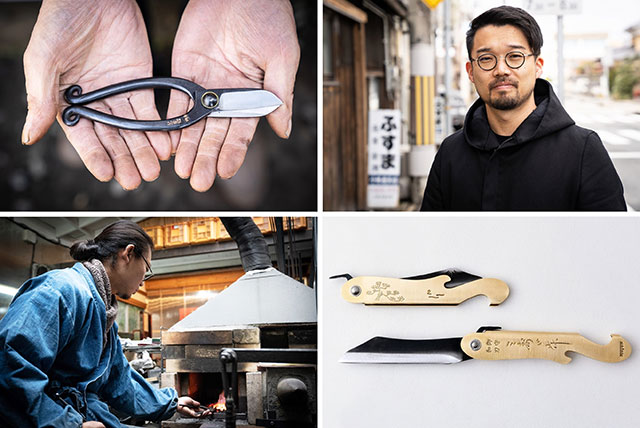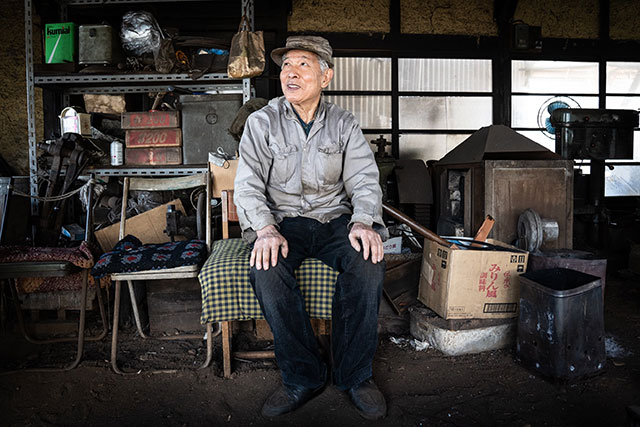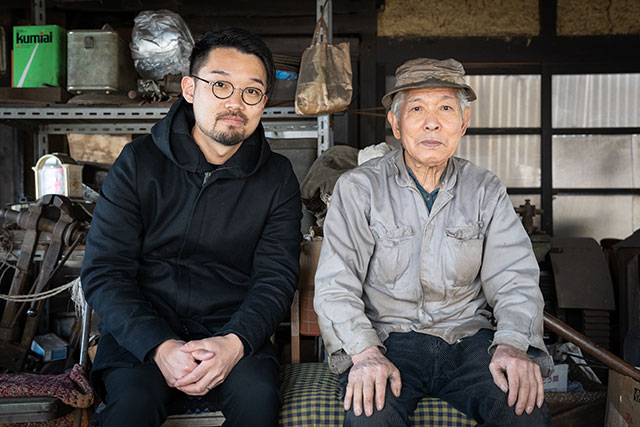
“Through this project I not only want to expose these various Japanese crafts to the world, but also shine a light on the history of the craftsmen and the way they have worked for generations”
Shinya Kobayashi, owner of Mujun (Coelacanth Shokudou LLC)
Meet Shinya Kobayashi, a product designer born and raised in Hyogo Prefecture, Japan. He is the brains and driving force behind the Mujun Workshop and Mujun, a brand of high-quality knives and scissors handcrafted in Hyogo, an area that has long been recognized for its fine metalwork and high number of very capable blacksmiths.
-
![Shinya outside the Mujun Workshop and Design Office in Hyogo]()
Shinya outside the Mujun Workshop and Design Office in Hyogo
Hyogo has been home to a bustling community of blacksmiths, making a variety of iron and steel tools for several hundred years, since the early Edo period. They have long supplied gardeners, ikebana artists, seamstresses and cooks across the country with a wide variety of scissors, knives and other metal-bladed tools. In Japanese the products they produce are known as Banshu Hamono (Banshu being the old name for the region, Hamono meaning bladed tool in Japanese), a term people up and down the country are familiar with, or at least were familiar with for many, many years. But times seem to have changed.
![Ikebana Scissors made by hand in Hyogo by a Banshu Hamono blacksmith. This area has produced high quality ikebana scissors for generations]()
Ikebana Scissors made by hand in Hyogo by a Banshu Hamono blacksmith. This area has produced high quality ikebana scissors for generations
![Fabric scissors made in Hyogo have been popular with seamstresses in Japan for generations]()
Fabric scissors made in Hyogo have been popular with seamstresses in Japan for generations
-
Sadly, in recent years, due to a number of reasons the blacksmith community in this area has been slowly decreasing in size. Family businesses have ceased to operate as the younger generations no longer want to continue the tradition of taking the helm and working in the same field as their parents and grandparents before them. Simply put, the allure of a job for a big corporation and the hustle and bustle of life in the big cities seems to be more appealing for youngers these days. This coupled with the emergence of mass-produced factory products flooding the market with cheaper (and of a poorer quality) alternatives, means the future for Banshu Hamono isn’t as bright as it once was.
That’s where Shinya Kobayashi comes into play. With a background in design, Shinya was contemplating which direction to take his career in when he happened to take an active interest in learning about the history of Banshu Hamono back in the early 2010s. When he learned about its inevitable fate should it continue along the same trajectory it has been slowly headed in for some years now, he felt overcome with a feeling of great sadness at the thought of a local tradition simply dying out because the younger generations had no interest in continuing it.
Not entirely sure what he could do to help get it back on track, Shinya took steps to find the last few surviving blacksmiths in the area, mostly aged between seventy and ninety years of age now, and chatted with them about ways he could help resurrect interest in their fading industry. At first the blacksmiths, who had for the most part, sadly accepted what they saw as the inevitable fate of their industry, either weren’t interested or didn’t believe things could be turned around at this late stage. They told him that all good things must come to an end and that the days of Banshu Hamono were now seemingly numbered.
Determined to make a difference Shinya set out to find young people in the area, with no experience in the field of metalwork, who were interested in his idea of bolstering the local tradition and making sure it can continue for many years to come, and he was successful.![Jumpei Fujita, one of the blacksmiths-in-training at Mujun Workshop]()
Jumpei Fujita, one of the blacksmiths-in-training at Mujun Workshop
![Inside the Mujun Workshop]()
Inside the Mujun Workshop
![Inside the Mujun Workshop]()
Inside the Mujun Workshop
-
Shinya succeeded in building a small team of budding wannabe blacksmiths and creating a workshop and studio for them to hone their skills in. Next, he introduced them to the older blacksmiths in the area, who finally agreed to share their many years of knowledge, experience and wisdom with them. The blacksmiths took on a new role of master, and the younger guys assumed the role of student. The road to completing their rigorous training would be a long one, but all parties were dedicated to making it a reality.
Now, several years later, the young team have learnt the ropes, are excelling in their new field of knowledge and are preparing to continue the growth of a long-practiced tradition almost on the brink of extinction.![Kouji Miyanohara, another of the blacksmiths-in-training at Mujun Workshop]()
Kouji Miyanohara, another of the blacksmiths-in-training at Mujun Workshop
mu8.jpg
![Learning the ropes and perfecting their craft, the new generation of blacksmiths at Mujun Workshop
are taking the knowledge shared from the older generation and working hard to reach a similar level]()
Learning the ropes and perfecting their craft, the new generation of blacksmiths at Mujun Workshop are taking the knowledge shared from the older generation and working hard to reach a similar level
-
Shinya explains, with obvious passion, that to him design is so much more than just simply aesthetics and form, it is also about learning and respecting the history behind an item and taking that knowledge to help the evolution of design to continue. This is the frame of mind he had when starting Mujun Workshop and his brand Mujun, which he uses to spread the word about Banshu Hamono overseas.
He has successfully managed to spread the word about the hard work and many years of high-quality craftsmanship to come out of Hyogo and in the process garnered solid interest in various countries about Banshu Hamono. Through Design Shows, Expos and relentless travel, Shinya has succeeded in forging partnerships with resellers and businesses around Europe, in North America and South Africa. Banshu Hamono is slowly becoming recognized around the world as some of the best quality blades to come out of Japan.
He has also managed to pick up several highly acclaimed accolades along the way, including winning the Wired Audi Innovation Award in 2019 and featuring in the top 100 for the Good Design Award in 2015.![Shinya Kobayashi explaining with passion and vigor how he has managed to spread the word of Banshu Hamono around the world, garnering interest from a number of resellers and businesses]()
Shinya Kobayashi explaining with passion and vigor how he has managed to spread the word of Banshu Hamono around the world, garnering interest from a number of resellers and businesses
![As well as training in traditional Banshu Hamono skills and techniques, the new generation of blacksmiths are also coming up with ideas and designs for new items to keep the spirit of Banshu Hamono alive. This Fuji knife is based on a popular scene of Mt. Fuji and breaking waves on the coast of Shizuoka, at Miho-no-Matsubara]()
As well as training in traditional Banshu Hamono skills and techniques, the new generation of blacksmiths are also coming up with ideas and designs for new items to keep the spirit of Banshu Hamono alive. This Fuji knife is based on a popular scene of Mt. Fuji and breaking waves on the coast of Shizuoka, at Miho-no-Matsubara
For now, the new generation of blacksmiths will continue to level-up their new-found skillset, Shinya will continue to spread the word of Banshu Hamono outside of Japan, and the older generation of blacksmiths continue to do their thing – continuing to make their products and assisting the new generation in their quest to learn the skills necessary to continue the legacy.
![Mr Inoue, ninety years old and still working hard to produce some of the best quality Ikebana scissors in the country. He is one of the several blacksmiths training the new generation at Mujun workshop]()
Mr Inoue, ninety years old and still working hard to produce some of the best quality Ikebana scissors in the country. He is one of the several blacksmiths training the new generation at Mujun workshop
-
![Each and every item handcrafted by Mr Inoue is made with passion and attention to detail like no other. In this respect each and every item is not like the other. Nothing about the process is rushed or mass-produced, and the techniques have been perfected and handed down over generations]()
Each and every item handcrafted by Mr Inoue is made with passion and attention to detail like no other. In this respect each and every item is not like the other. Nothing about the process is rushed or mass-produced, and the techniques have been perfected and handed down over generations
![An example of Mr Inoue’s much revered and well used ikebana scissor designs]()
An example of Mr Inoue’s much revered and well used ikebana scissor designs
![Mr Inoue, a blacksmith who came from a time where quality and dedication to one’s craft really mattered. Hopefully with his guidance over those at Mujun workshop, future generations of Banshu Hamono blacksmiths will have a similar level of dedication and passion]()
Mr Inoue, a blacksmith who came from a time where quality and dedication to one’s craft really mattered. Hopefully with his guidance over those at Mujun workshop, future generations of Banshu Hamono blacksmiths will have a similar level of dedication and passion
-
![Shinya Kobayashi and Mr Inoue, bridging the gap between generations and hopefully securing the legacy of Banshu Hamono for many more years to come]()
Shinya Kobayashi and Mr Inoue, bridging the gap between generations and hopefully securing the legacy of Banshu Hamono for many more years to come
Mujun products can be found in a number of places around the world, and the list is set to continue growing, be sure to check out the stores listed below if they happen to be near you, or you can search online for other places that stock their goods.
MIDNIGHT, Australia
Japanese Knife Company, UK and Sweden
Knifewear, Canada
Dieter Schmid, Germany
Kinome, Switzerland
Or you can peruse their latest offerings over on the Mujun website (English):
https://www.mujun.co.jp/- Limited liability company Coelacanth Shokudo
-
-
- Hyogo Ono-shi Nishihonmachi 527
-
-
-
- 0794632265
-
View AllHotel Route Inn Ono
1503-1, Shikiji-cho, Ono-shi Hyogo

















 Go here
Go here










